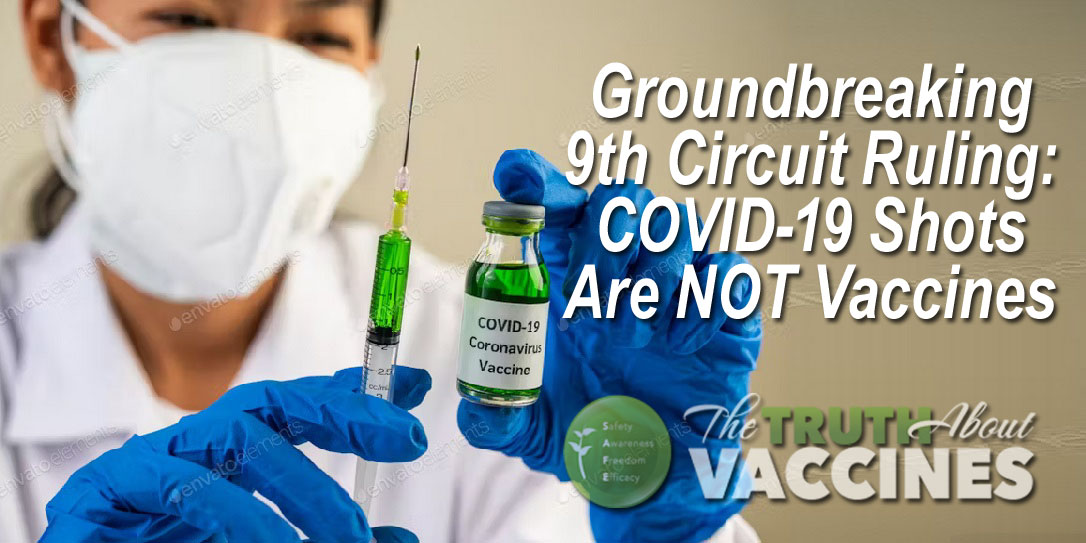TTAV is experiencing heavy censorship on many social media channels since we’ve been targeted by the mainstream media sellouts, social media bullies, and political turncoats. Be sure to get the TRUTH by subscribing to our email list. It’s free.
![]()
In a landmark decision, the 9th Circuit Court recently ruled that COVID-19 injections do not qualify as vaccines under certain legal and regulatory definitions. This ruling has sparked widespread debate and has significant implications for public health policy, legal frameworks, and the ongoing management of the COVID-19 pandemic.
The ruling stems from a lawsuit challenging the classification of COVID-19 mRNA injections, such as those developed by Pfizer-BioNTech and Moderna, as vaccines. Plaintiffs argued that these injections should not be categorized as vaccines due to their novel mechanism of action, which differs fundamentally from traditional vaccines.
In its decision, the 9th Circuit Court emphasized that traditional vaccines typically contain inactivated or attenuated viruses that stimulate an immune response by mimicking natural infection. In contrast, COVID-19 mRNA injections deliver genetic instructions for cells to produce the spike protein found on the surface of the SARS-CoV-2 virus, which then triggers an immune response.
The crux of the argument boils down to the fact that COVID-19 shots do not meet the legal definition of vaccines because they do not prevent transmission of the virus. As a result, the landmark Jacobson v. Massachusetts decision, which has historically been used to justify mandatory vaccinations, cannot be applied to COVID-19 vaccines. This ruling implies that mandates for COVID-19 vaccinations cannot be legally supported by the precedent set in Jacobson, potentially altering the legal landscape for public health policy and individual rights regarding vaccination requirements.
The judge wrote:
At this stage, we must accept plaintiff’s allegation that the vaccine does not stop prevent the spread of COVID-19 as true. Therefore, Jacobson does not apply.”
Legally, the ruling could affect the liability protections provided to vaccine manufacturers under the Public Readiness and Emergency Preparedness (PREP) Act. Manufacturers face increased legal risks if mRNA injections are not classified as vaccines. Big Pharma giants have expressed concern over the ruling. Pfizer and Moderna released statements defending the classification of their products as vaccines, citing the WHO and the CDC, both of which classify mRNA injections as vaccines.
This ruling comes amid growing public concern over government mandates and the transparency of Big Pharma’s “questionable? practices. This decision is critical to greater autonomy and accountability in medical decisions. It highlights the need for a clearer distinction between traditional vaccines and newer mRNA technologies, which operate differently and thus should be regulated differently.
This legal development could also influence future public health policies and mandates. By requiring more precise definitions and regulations, the ruling may ensure that medical interventions are more accurately represented to the public, fostering better-informed decision-making.
BOTTOM LINE: The 9th Circuit Court’s ruling that COVID-19 mRNA injections are not traditional vaccines as defined in Jacobson, therefore they cannot be mandated, represents a significant shift in the legal landscape surrounding the COVID-19 “clot shots.”
Follow, Subscribe, & SHARE:
1. X, Formerly known as Twitter: https://twitter.com/TTAVOfficial
2. Telegram: https://t.me/TheTruthAboutCancer_Vaccines
3. GAB: https://gab.com/TyCharleneBollinger
4. GETTR: https://gettr.com/user/cancertruth
5. TruthSocial: https://truthsocial.com/@TheTruthAboutCancer
6. CloutHub: https://app.clouthub.com/#/users/u/TheTruthAboutCancer
7. Bitchute: https://www.bitchute.com/channel/vX3lcHH4Dvp0/
8. Rumble: https://rumble.com/c/TheTruthAboutCancerOfficial
9. Brighteon: https://www.brighteon.com/channels/thetruthaboutcancer












would like more infomation.
I have been neurologically damaged and impaired by the Phyzer Covid injection. My doctors have agreed, as has social security disability.. I’m on 3 1/2 years disabled from the head pain I’ve received from it.. I’m ready to sign onto a law suit against Phyzer and the govt, and the individuals like Fauci, as soon as you are ready, or hear of one.
I would just like either the title of the case or the docket number so I can look up & print the actual documents please. Thank you for the work you do & God Bless